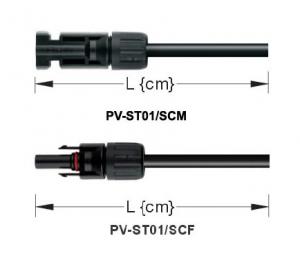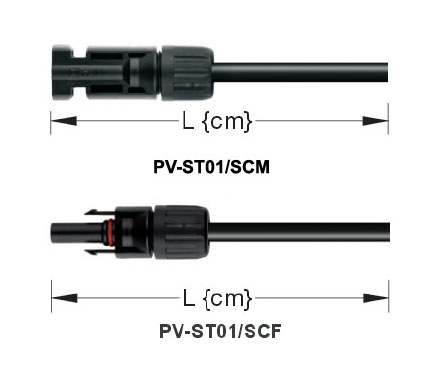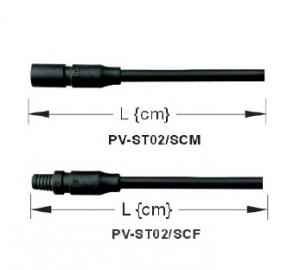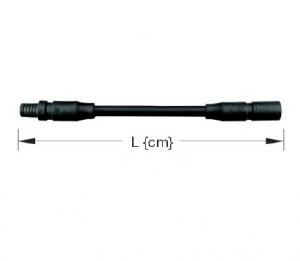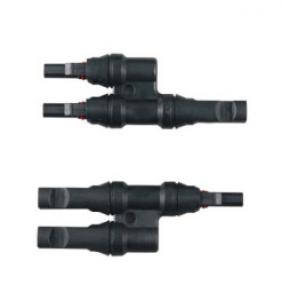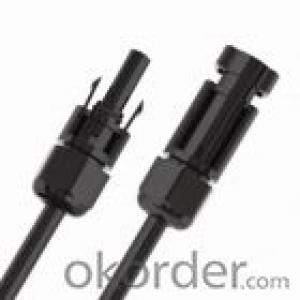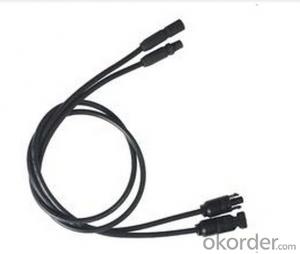Solar cable Connector ST01 SCF SCM
- Loading Port:
- China Main Port
- Payment Terms:
- TT OR LC
- Min Order Qty:
- -
- Supply Capability:
- 10000 set/month
OKorder Service Pledge
OKorder Financial Service
You Might Also Like
Solar Cable Connectors,Due to highly robustness,UV-resistance,the touch protection a high grade connection is guaranteed for many years
Rated voltage 1000 V
Rated current 22A(2.5mm2)
30A(4mm2,6mm2)
Dia.of pin or socket 4mm
Protection degree(mated,junction box closed/unmated) IP65/IP2X
Operating temperature - 40 °c to +85°c
Contact material Copper,silver plated
- Q: Can solar energy systems be used for powering agricultural machinery?
- Yes, solar energy systems can be used for powering agricultural machinery. Solar panels can generate electricity which can be used to power various farm equipment such as irrigation pumps, grain dryers, and tractors. This helps reduce dependence on fossil fuels, lowers operating costs, and promotes sustainable agricultural practices.
- Q: How do solar energy systems impact the energy efficiency of a home?
- Solar energy systems have a significant impact on the energy efficiency of a home. By harnessing the power of the sun, these systems generate electricity that can be used to power various appliances and devices within the household. This reduces the dependence on traditional energy sources, such as fossil fuels, and helps in reducing greenhouse gas emissions. One of the key advantages of solar energy systems is that they provide a clean and renewable source of power. By utilizing the abundant sunlight, homeowners can generate their own electricity, thereby reducing their reliance on the grid. This not only helps in conserving natural resources but also lowers the overall carbon footprint of the household. Another way in which solar energy systems enhance energy efficiency is through the concept of net metering. Net metering allows homeowners to sell excess electricity generated by their solar panels back to the grid, thereby offsetting their energy consumption during times when the sun is not shining. This ensures that the energy produced by the solar panels is efficiently utilized and not wasted. Furthermore, solar energy systems often come with advanced monitoring and control features that allow homeowners to track their energy usage in real-time. This enables them to identify areas of high energy consumption and take necessary steps to optimize their energy usage. By making informed decisions based on this data, homeowners can further enhance the energy efficiency of their homes. In addition to reducing electricity bills, solar energy systems also increase the value of a home. Studies have shown that homes equipped with solar panels tend to sell at a higher price compared to those without. This is because potential buyers are attracted to the idea of reduced energy costs and an environmentally friendly lifestyle. Overall, solar energy systems play a crucial role in improving the energy efficiency of a home. By harnessing the power of the sun, homeowners can reduce their reliance on traditional energy sources, lower their carbon footprint, and save money on electricity bills. With continuous advancements in solar technology, these systems are becoming increasingly efficient and affordable, making them a viable option for homeowners looking to make their homes more energy-efficient.
- Q: How do solar energy systems impact energy security?
- Solar energy systems have a positive impact on energy security as they diversify the energy sources and reduce reliance on fossil fuels. By harnessing the abundant and renewable sunlight, solar energy systems provide a stable and reliable source of electricity, decreasing the vulnerability to disruptions in fossil fuel supply chains. Additionally, the decentralized nature of solar power allows for distributed energy generation, reducing the risks associated with centralized energy systems. Overall, solar energy systems enhance energy security by promoting sustainability, resilience, and independence in the energy sector.
- Q: Can solar energy systems be used for desalination of water?
- Yes, solar energy systems can be used for the desalination of water. Solar-powered desalination systems harness the energy from the sun to power the desalination process, which removes salt and impurities from seawater or brackish water, making it suitable for various applications such as drinking, irrigation, or industrial use. These systems typically utilize solar panels to generate electricity, which then powers the desalination equipment, such as reverse osmosis membranes or solar stills, to separate freshwater from saltwater. This sustainable and renewable approach offers a promising solution for addressing water scarcity issues in regions with ample sunlight and limited freshwater resources.
- Q: Are there any government incentives or tax credits for installing a solar energy system?
- Installing a solar energy system comes with a range of government incentives and tax credits that aim to promote renewable energy and reduce reliance on fossil fuels. One notable incentive is the federal Investment Tax Credit (ITC), which enables homeowners and businesses to deduct a portion of their solar system installation costs from their federal taxes. As of 2021, the ITC offers a 26% tax credit for both residential and commercial solar installations. However, it's important to be aware that this percentage may change in the future, so it's wise to seize the opportunity while the current rate applies. Moreover, various states and local governments provide their own incentives and tax credits for solar installations. These incentives can differ significantly, but commonly involve rebates, grants, or exemptions from property taxes for individuals and businesses that adopt solar energy systems. Additionally, numerous states offer net metering programs that enable solar system owners to receive credits on their utility bills for any surplus electricity they generate and feed back into the grid. This allows owners to offset their electricity costs and potentially earn money by selling excess energy. In summary, there exists a plethora of government incentives and tax credits for solar energy system installations. Their purpose is to make solar installations more affordable and encourage the transition to clean, renewable energy sources. To fully comprehend and benefit from the available incentives and credits in your area, it is advisable to consult local authorities, utility companies, and tax professionals.
- Q: Can solar energy systems be used in powering art galleries or museums?
- Art galleries and museums can definitely utilize solar energy systems to power their establishments. In fact, there are numerous benefits associated with the use of solar power in these venues. Firstly, due to their large spaces and extensive lighting systems, art galleries and museums consume a significant amount of energy. By implementing solar energy systems, these establishments can generate a substantial amount of electricity, reducing their reliance on traditional energy sources and cutting down on operating expenses. Furthermore, incorporating solar energy aligns with the environmental values often associated with art and culture. By utilizing clean and renewable energy, art galleries and museums can greatly reduce their carbon footprint and contribute to global efforts in fighting climate change. Additionally, solar energy systems provide a reliable source of power, particularly during peak hours when galleries and museums experience a high influx of visitors. Moreover, the installation of solar panels on the rooftops of these establishments can serve as a visual representation of their commitment to sustainability, inspiring visitors to adopt similar practices in their own lives. However, it is important to consider that the feasibility of solar energy systems in art galleries or museums may vary depending on factors such as available roof space, geographical location, and specific energy requirements. Conducting a comprehensive assessment and feasibility study is vital to determine the optimal size and configuration of the solar energy system for each individual establishment. Overall, solar energy systems offer a clean, renewable, and cost-effective solution for powering art galleries and museums. Implementing these systems not only aligns their operations with sustainable practices but also reduces their environmental impact.
- Q: Can solar energy systems be used for powering military or defense installations?
- Yes, solar energy systems can be used to power military or defense installations. Solar power offers several advantages for these installations, including reducing dependence on fossil fuels, enhancing energy security, and providing a reliable source of electricity in remote or off-grid areas. Additionally, solar energy can contribute to reducing the environmental impact of military operations and help achieve sustainability goals. Many countries are increasingly adopting solar power for their military bases, with some even deploying portable solar systems to support field operations.
- Q: Can a solar energy system be installed in areas with frequent lightning strikes?
- It is indeed possible to install a solar energy system in areas prone to frequent lightning strikes, but certain precautions must be taken to ensure its safety. Failure to do so could result in potential damage to solar panels, inverters, and other system components. To reduce the risk, several strategies can be implemented. The installation of a lightning protection system (LPS), which incorporates lightning rods, grounding systems, and surge protection devices, is highly recommended. These systems are designed to divert lightning strikes away from the solar panels and safely dissipate the electrical energy into the ground. Additionally, the use of high-quality surge protectors and lightning arrestors in electrical and communication lines can protect the system from power surges caused by lightning strikes. Furthermore, it is crucial to select durable and robust solar panels and inverters that meet industry standards for lightning protection. Some manufacturers offer products specifically designed to withstand severe weather conditions, including lightning strikes. Regular maintenance and inspections are also essential to ensure the continued safety and functionality of the system. This includes checking the integrity of the lightning protection system and inspecting the solar panels and other components for signs of damage or wear. In conclusion, while it is feasible to install a solar energy system in areas with frequent lightning strikes, it is essential to implement proper precautions and protective measures. Collaborating with experienced solar installers who possess knowledge about lightning protection systems can guarantee the secure and efficient operation of the solar energy system, even in high-risk areas.
- Q: Can solar energy systems be integrated with other energy sources?
- Yes, solar energy systems can be integrated with other energy sources. In fact, this is a common approach in many applications to ensure a reliable and consistent supply of electricity. Solar energy is intermittent, as it depends on the availability of sunlight. Therefore, integrating solar energy systems with other energy sources, such as batteries or a power grid, can help to store excess energy generated during sunny periods and provide electricity when there is no sunlight. One popular method of integration is through the use of hybrid systems, where solar panels are combined with other renewable energy sources like wind or hydroelectric power. This allows for a more consistent and reliable energy supply, as different sources can compensate for each other's fluctuations. Additionally, solar energy systems can also be integrated with traditional energy sources like natural gas or coal-based power plants. This allows for the reduction of carbon emissions and the transition towards a cleaner and more sustainable energy mix. By combining solar energy with other sources, the overall energy generation capacity is increased, providing a more stable and secure energy supply. Overall, integrating solar energy systems with other energy sources is a practical and effective way to maximize the benefits of renewable energy while ensuring a continuous and reliable electricity supply.
- Q: Are there any risks of electrical malfunctions or failures during extreme weather events with solar energy systems?
- Yes, there are some risks of electrical malfunctions or failures during extreme weather events with solar energy systems. Severe weather conditions such as hurricanes, tornadoes, hailstorms, or heavy snowfall can potentially damage solar panels, inverters, or electrical wiring, leading to system failures. Additionally, lightning strikes can pose a risk to solar energy systems, potentially causing damage or complete failure. However, proper installation, regular maintenance, and adhering to industry standards can help mitigate these risks and ensure the resilience of solar energy systems during extreme weather events.
Send your message to us
Solar cable Connector ST01 SCF SCM
- Loading Port:
- China Main Port
- Payment Terms:
- TT OR LC
- Min Order Qty:
- -
- Supply Capability:
- 10000 set/month
OKorder Service Pledge
OKorder Financial Service
Similar products
Hot products
Hot Searches
Related keywords
